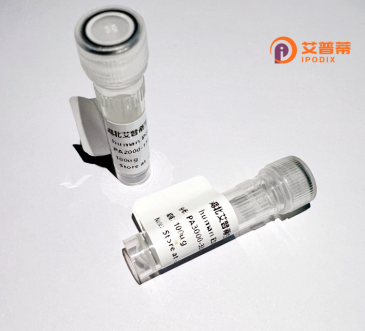
| 纯度 | >90%SDS-PAGE. |
| 种属 | Human |
| 靶点 | BCL2L12 |
| Uniprot No | Q9HB09 |
| 内毒素 | < 0.01EU/μg |
| 表达宿主 | E.coli |
| 表达区间 | 1-333aa |
| 氨基酸序列 | MGRPAGLFPPLCPFLGFRPEACWERHMQIERAPSVPPFLRWAGYRPGPVRRRGKVELIKFVRVQWRRPQVEWRRRRWGPGPGASMAGSEELGLREDTLRVLAAFLRRGEAAGSPVPTPPSPAQEEPTDFLSRLRRCLPCSLGRGAAPSESPRPCSLPIRPCYGLEPGPATPDFYALVAQRLEQLVQEQLKSPPSPELQGPPSTEKEAILRRLVALLEEEAEVINQKLASDPALRSKLVRLSSDSFARLVELFCSRDDSSRPSRACPGPPPPSPEPLARLALAMELSRRVAGLGGTLAGLSVEHVHSFTPWIQAHGGWEGILAVSPVDLNLPLD |
| 分子量 | 63.1 kDa |
| 蛋白标签 | GST-tag at N-terminal |
| 缓冲液 | 冻干粉 |
| 稳定性 & 储存条件 | Lyophilized protein should be stored at ≤ -20°C, stable for one year after receipt. Reconstituted protein solution can be stored at 2-8°C for 2-7 days. Aliquots of reconstituted samples are stable at ≤ -20°C for 3 months. |
| 复溶 | Always centrifuge tubes before opening.Do not mix by vortex or pipetting. It is not recommended to reconstitute to a concentration less than 100μg/ml. Dissolve the lyophilized protein in distilled water. Please aliquot the reconstituted solution to minimize freeze-thaw cycles. |
以下是关于重组人Bcl-2样蛋白12(BCL2L12)的3篇参考文献及其简要摘要:
---
1. **文献名称**:*BCL2L12-mediated Inhibition of Caspase-7 and Caspase-9 in Glioblastoma*
**作者**:Stegh AH, et al.
**摘要**:研究发现BCL2L12在胶质母细胞瘤中高表达,通过直接抑制caspase-7和caspase-9活性,促进肿瘤细胞抵抗凋亡,并与患者预后不良相关。
2. **文献名称**:*BCL2L12 Expression in Breast Cancer: Correlation with Clinical Outcomes*
**作者**:Kontos CK, et al.
**摘要**:该研究表明,BCL2L12在乳腺癌组织中表达显著上调,其高水平与肿瘤分期进展、转移及化疗耐药性相关,提示其可作为潜在预后标志物。
3. **文献名称**:*BCL2L12 Modulates Apoptosis via Interaction with SMN1 and microRNA Regulation*
**作者**:Floros KV, et al.
**摘要**:揭示BCL2L12通过与运动神经元蛋白(SMN1)结合及调控miR-21/miR-138通路,影响肿瘤细胞凋亡进程,并在神经母细胞瘤中发挥促生存作用。
---
以上文献分别从BCL2L12抑制caspase的分子机制、临床相关性及其信号通路互作角度探讨其功能,覆盖胶质瘤、乳腺癌等多种癌症类型的研究。
Recombinant human Bcl-2-like protein 12 (BCL2L12) is a member of the Bcl-2 protein family, which is primarily involved in regulating apoptosis (programmed cell death). Initially identified for its overexpression in glioblastoma, BCL2L12 has garnered attention for its dual role in cancer biology. Unlike canonical anti-apoptotic Bcl-2 members, BCL2L12 exhibits context-dependent functions—it may suppress apoptosis in certain cancers by sequestering pro-apoptotic proteins or interacting with p53. while promoting cell death in others through caspase-dependent pathways or post-transcriptional gene regulation. Structurally, BCL2L12 contains conserved Bcl-2 homology (BH) domains critical for protein interactions, alongside unique C-terminal regions that enable RNA-binding activity, linking it to mRNA processing and stability. Recombinant BCL2L12. generated via genetic engineering systems like *E. coli* or mammalian cells, facilitates functional studies, revealing its potential as a prognostic biomarker in cancers such as colorectal carcinoma and breast cancer. Its dysregulation is associated with chemotherapy resistance, implicating therapeutic relevance. However, tissue-specific expression patterns and splicing variants (e.g., mitochondrial vs. nuclear isoforms) complicate its mechanistic landscape. Ongoing research aims to clarify its pleiotropic roles in tumorigenesis, metastasis, and treatment response, highlighting BCL2L12 as a versatile yet enigmatic target in cancer therapeutics and diagnostics.
×